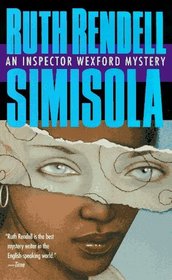Ruth Rendell Examines Race
In this excellent police procedural, Rendell examines attitudes toward race in her characters. There are only nineteen "people of color" in Kingsmarkham, and Inspector Wexford and others assume they all know each other. Rendell tries to be progressive, but it's a struggle for her, just as being non-sexist is. Still, the book is terrific, and you get the sense that she knows just how flawed her characters are.
FROM THE PUBLISHER
"It's probably nothing," says Dr. Akande to Chief Inspector Wexford, who gets his usual chill upon hearing these words. "I'm trying in vain to locate my daughter Melanie." As Wexford's investigation of this missing person continues over days and weeks, it becomes his unhappy job to counter the tenuous hopes of the doctor and his wife. It is Wexford's professional opinion that Melanie is, in all likelihood, dead. A murdered woman is found: not Melanie, but the last person known to have seen and spoken to her. A second woman's body is discovered, again not Melanie's but, like her, young and black. A third woman turns up beaten and unconscious; like the previous victim, she is of Nigerian origin. That there is a connection is obvious. Exactly what it is that links these women and their misfortunes is the vexing mystery.
Ruth Rendell's Inspector Wexford books are one of my favorites. This one is satisfyingly complex and held my interest throughout.




